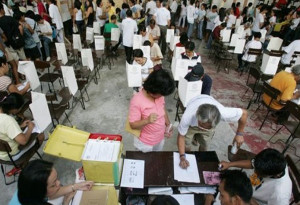
The course and outcome of the elections were closely followed in the capitals of the leading powers of the Asia-Pacific region (in which Southeast Asia is becoming increasingly politically significant) and, above all, in Beijing. This interest is understandable, taking into account the extremely important strategic position of the Philippines, which, in the course of the Second World War, were right at the center of the Pacific front.
Located on ten major islands and about seven thousand smaller ones constituting the Philippine archipelago, this country, which has a 2 thousand km stretch of border along the eastern part of the South China Sea, has in recent years appeared at the center of an all-round confrontation between the leading players: the United States and Japan, on the one hand, and China on the other.
As for the players at the ‘local’ level, the Philippines continues to actively participate in the South China Sea as a main ally to China’s global opponents. A legal application that the Philippines submitted to The Hague will soon be considered by the Arbitral Tribunal. The subject of this application is a request by the Philippines to assess the legality of China’s claims to 80% of the South China Sea waters, and to most of the archipelagoes located in the vicinity.
Since the Philippines is a presidential republic, the external ‘interested’ parties are paying a great deal of attention to the outcome of the presidential election.
In Beijing, hopes for positive changes in Sino-Philippine relations have until recently been associated with the change of office of Benigno Aquino III, who served as President of the Philippines since 2010. During his presidency, these relations, as well as the situation in the South China Sea as a whole, deteriorated sharply. The issue of the role that Benigno Aquino III has played in this entire conundrum is quite debatable.
International media outlets are already awash with the vivid image of Donald Trump for a host of reasons. This image now represents the new Philippine President, Rodrigo Duterte. Certainly not a young (71-year) politician, he spent 22 years of his life as mayor of Davao, the main city on the island of Mindanao, which is the second largest island on the Philippine archipelago.
It is Mindanao, home to a fifth of the 100 million population of the Philippines, which is the center of much of the country’s domestic problems. It is here, that the most acute forms (including armed struggle) of the conflicts in social, ethnic and religious terms manifest themselves.
However, the ‘severity’ of the measures that R. Duterte implemented in an attempt to appease the situation on the island has earned him popularity among a large part of the Philippines’ electorate. He won, beating the nearest competitor by quite a considerable margin.
Now the country’s citizens are handing over the fate of their whole country into his hands. In addition, by examining R. Duterte’s domestic policies, if it becomes apparent that he will be using methods that are ‘well-proven’ in Mindanao, it is possible only to speculate on what his approaches to foreign policy issues will be. This is exactly what Chinese experts, perhaps the most interested outside observers of the Philippine domestic processes, are doing.
Concerning the most urgent problem for China today, the above-mentioned request by the Philippines for arbitration at The Hague, it can almost certainly be said that “that ship has sailed.” Moreover, irrevocably. The hearing is expected to take place in late May or June.
As for the easily-predictab
The day after the elections were held in the Philippines, the Chinese Global Times, semi-official newspaper, published an article with a headline that basically reproduced the words spoken at the press conference by a representative from the Chinese Ministry of Foreign Affairs, who remarked: “China warns Philippines against ‘blackmail’ on South China Sea”.
The main thrust of the speech by the Chinese official boiled down to the initial statement of China’s readiness to resolve territorial disputes with the Philippines (“as with other neighbors”) in the form of bilateral negotiations. Manila missed this possibility, however, when it contacted The Hague Arbitration with a complaint against China, in which it presented itself as a poor defenseless country that is suffering from the actions of one of the world’s major powers.
In conclusion, it should be noted that the Philippines hardly has the potential to significantly influence the “big-time politics” formed in the Southeast-Asian sub-region by the world’s leading players. However, this, of course, does not mean that the Philippines is totally incapacitated. Suffice it to say, that the Philippines is a member of ASEAN, and in regional affairs, the role of this Association, which includes 10 Southeast Asian countries, cannot be underestimated.
The issue of how the new President of the Philippines, Rodrigo Duterte, will deal with the existing opportunities on the international arena as far as foreign policy is concerned will become clear in the near future.
Vladimir Terekhov, an expert on the issues of Asia-Pacific region, exclusively for the online magazine “New Eastern Outlook.”
